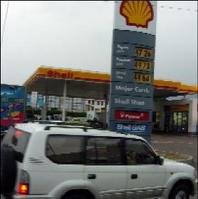Paul Messam, Gleaner Writer
As long as we drive a car, a bus, a truck, a taxi or ride a motorbike, conservation has to be the way to go. With the spiralling petrol price from a low of $67.85 to a high of $77.29, we have to conserve as much as possible. Vincent van Gogh once made the point that "Great things are not done by impulse, but by a series of small things brought together; and great things are not something accidental, but must certainly be willed."
We have to develop the will to be a fuel saver. Driving is essentially an activity of the mind, and our bodies are important only in that they translate the impulses of our thoughts as we meet and attempt to solve the challenges of expensive fuel and the many challenges of the road. A motorist, when gripped by an emotion, tend to very often over-accel-erate and over-brake. These actions use more fuel than is necessary.
"We need to conserve for the simple reason that we do not produce oil," advised Kenneth Shaw, president of the Jamaica Used Car Dealers Association. "As a country, we need to look a But thes are sometimes not readily available, and therefore the thing to do is to conserve! conserve! conserve!" According to him, a dirty air filter on your vehicle wastes gasolene and so a well-maintained motor car and one that is properly tuned can cut the fuel bill drastically.
Car-pooling, says Shaw, is a good way of conserving fuel. "Combine a number of short errands into one trip and, if possible, select the least-travelled and least-crowded daily routes; drive at a smooth pace by looking and reading the road ahead."
Driving styles also affect how much gas our vehicles consume. "Drivers should accelerate moderately from a stop to the speed we plan to use," says Lurkent Hanson, a senior instructor at the Advanced Driver Training Centre, an accredited driving institution which operates out of Lakes Pen, St. Catherine.
Energy-saving tips
❖ ❖ ❖ ❖ ❖ ❖ ❖
1 When driving on the highway, use the highest gear to save fuel. Be sure that the parking brake is fully released. If not, extra power will be required to move the car if it is partially on.
2 When coming out of a turn, accelerate smoothly. Sudden acceleration wastes fuel.
3 Drive at moderate speeds. Driving at a steady speed saves fuel.
4 When you need to move very slowly, do not use the accelerator. Idling speed of the engine will move the car without wasting fuel. When creeping, hold your foot above the footbrake in an automatic shift; maintain clutch at friction point in stick-shift car.
5 When starting from a stop on a steep hill, do not race the engine. Accelerate only enough to feel the engine start to pull or move the car forward without rolling back. Racing the engine wastes gas. While stopped, avoid idling the engine for more than a minute.
6 Remember to use your trunk instead of a roof top carrier. You save fuel by lowering your car's centre of gravity and reducing windresistance while moving.
7 When you carry extra weight in your car, you will use more fuel. Do not use your car to store anything that you need.
8 Keep your tyres properly inflated for best traction and mileage.
9 When approaching a hill, accelerate just before the beginning of the climb. You can use the car's momentum rather than more fuel to start up the hill.
10 Park on a downhill grade when you have a full tank of fuel to prevent spilling. Parking downhill also takes less fuel to start moving.
11 Let up on the accelerator early when approaching a red traffic light. This action not only saves fuel but also may give time for the light to change to green.
12 Read the road and try to identify blocked lanes or objects in your path early in order to avoid unnecessary stops.
13 Choose a route that requires fewest stops and speed changes. While stopped at traffic lights, stay stopped where you are. Do not move up a bit and stop again. Moving up each time wastes fuel. Keep your vehicle in good working order.
Ricardo Makyn/Staff Photographer
A motorist enters the Shell service station on Constant Spring Road, St. Andrew on November 22, 2005. Shell announced the sale of its 56 fuel retail stations to Cool Petroleum Holdings Limited.

